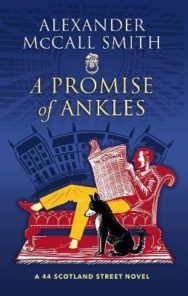‘Instead, he is a celebrant of the good things in life – friendship, art, wit, kindness, comedy and above all a profound love of both Edinburgh and Scotland.’
As the latest volume in Alexander McCall Smith’s serial novel comes to an end in The Scotsman newspaper, David Robinson looks back at working on the series on the release of A Promise of Ankles.
A Promise of Ankles
By Alexander McCall Smith
Published by Polygon
For many years, there has been one editing job that I have looked forward to more than all others. Ever since 2004, when the first volume of Alexander McCall Smith’s 44 Scotland Street ‘daily novel’ first appeared in The Scotsman, I’ve been in charge of making sure that it did so without any mis-spellings or grammatical howlers before it went on to be published by Polygon. As Sandy has somehow acquired the knack of writing at speed (1000 words an hour), to length, and with minimal mistakes, this is one of the easier jobs in journalism. Because those words are also loaded with a fair dollop of wit and wisdom, it is also one of the more enjoyable.
Last week the 14th volume – a world record for a serialised novel, no less – ended its run in The Scotsman, ahead of publication this week by Polygon as The Promise of Ankles. Time perhaps for an insider’s guide to the crafting of a serial novel.
Though ubiquitous in the nineteenth century, these days the serial novel is a rarity. One of the few recent examples is American writer Armistead Maupin’s Tales from the City series. When Sandy met him in California in 2003, he made that very point. Why weren’t more writers following his example, he asked him. When Sandy mentioned this in an article in the Herald, I wondered the same thing. Would he himself be interested in writing a series novel? I asked. Yes, he replied.
Over lunch at The Witchery in Edinburgh, the Editor of The Scotsman expressed delight at the news. ‘But would you be able to write it daily?’ he asked as we rose from the table. Sandy hadn’t been expecting that. After all, Dickens, Flaubert, Tolstoy, Zola, Hardy and all the other star serial novelists of the 19th century usually had at least a month between instalments. Even readers of Maupin’s serial fiction in the San Francisco Chronicle had to wait for a week for the next episode. A successful daily novel would be a world first.
The true serial novel isn’t just one that has already been written and chopped up into equal-length chapters. Instead, it is created on the hoof: once made, mistakes can’t be corrected, characters changed, or dialogue rewritten. If all novels are tightrope walks, this is one without a safety net. Typically, McCall Smith starts off with about 20 episodes of each Scotland Street novel already written, but with 50 or so still to write. In pre-pandemic days, he filed these from all over the world, and although he never missed a deadline, there were times – like when his email link went down on a cruise round Cape Horn – when I wondered whether I would have to step into the breach and write an episode of my own. Fortunately for his readers, it never came to that.
Sandy hadn’t arrived at that Witchery meeting with a firm idea of what characters he wanted to write about, but he knew exactly where they lived. He himself had once stayed near Scotland Street, so he knew the New Town well, loved its charm, variety, and realised he could have fun with its occasional pretensions.
Let’s pause here and imagine that you or I had to choose the characters for a series novel set in Edinburgh’s New Town. My guess is that we’d aim for a rough sociological mirroring for our fiction. And why not?
Yet look again at the dramatic personae in The Promise of Ankles. For a start it’s called that because a small part of it takes place inside the mind of a dog tempted to nip the ankles of his master’s friend. The main character? Bertie, a seven-year-old boy breaking away from his hothousing mother. His gran? A Glasgow pie shop owner. His neighbour? A socialite Italian nun who speaks almost entirely in aphorisms. Hardly New Town stereotypes, any of them.
Yet at the same time, the Scotland Street novels aren’t just untethered comic whirligigs either. McCall Smith might write about absurd situations – infighting within the Moray Place-based Association of Scottish Nudists, for example – but there is never anything cruel about his comedy. Instead, he is a celebrant of the good things in life – friendship, art, wit, kindness, comedy and above all a profound love of both Edinburgh and Scotland, an emotion which also finds expression in his just-published debut poetry collection, In a Time of Distance (Polygon, £12.99).
What kind of story would we tell in our own putative Edinburgh serial novel? Again, I fear we’d get that wrong and, seduced by tartan noir, contemplate a thriller or a crime novel, failing to realise that the serial novel can’t really handle anything with a particularly complicated or convoluted plot. McCall Smith, whose own tastes run to the shrewd, slow-building comedies of Barbara Pym, intuitively realised that something similar could easily be adopted to serial fiction. Just as Armistead Maupin centred his tales on 28 Barbary Lane, on San Francisco’s Russian Hill, so he himself could base an enjoyable Edinburgh comedy of manners around a New Town stairwell, and that if the characters were sufficiently interesting or different, we would happily follow their interactions in subsequent volumes.
So now we’re onto book 14 in a series that that has already won the hearts of readers throughout the world. In McCall Smith’s new novel, they’ll discover that seven-year-old Bertie finally gets to live in the Promised Land (Glasgow), just as his father’s budding romance is stymied by the narcissistic Bruce Anderson (not a real villain but the nearest we get to one here). But though we read on to find out what happens to the characters, the real charm of 44 Scotland Street lies in the sometimes surreal unpredictability of the other stories McCall Smith will add to the mix. The chapter headings hint at their range. ‘Rhododendrons and Missionaries’. ‘Bruchan Lom’. ‘Akratic Action’. ‘A Speluncean Entrance.’ I’ll explain one of them and you’ll see what I mean.
Speluncean means ‘like a cave’, and when two characters go exploring by the Water of Leith near Stockbridge with Cyril (the titular ankle-tempted dog), the latter roots around in a shallow cave and comes up with what looks suspiciously like a human skull. Except it’s shaped differently, like a Neanderthal one. This discovery could rewrite archaeology, because Neanderthals hadn’t hitherto been known to venture this far north. Could Cyril have inadvertently proved that the New Town was Neanderthal before it was either new or a town?
I’ll leave you to find that out for yourself. But here’s the odd thing. A couple of weeks after I edited that chapter, I read a story in a newspaper about the discovery of 120,000-year-old stones thought to be Neanderthal tools on an island off Denmark. Because the earliest human remains in Denmark – as in Scotland – only go back 14,000 years and there was no evidence of Neanderthals so far north, this is thought to be a potentially significant find. So if, in the future, anyone ever does find proof that Neanderthals did make it as far as Edinburgh’s New Town – a couple of hundred miles further north than their remains have ever been recorded, but on the same line of latitude as that Danish island – it will be only fair to point out that McCall Smith got there first. And if Homo McCall Smithiensis turns out to have had an exceptionally large brain and well-developed smile muscles, I won’t be at all surprised.
A Promise of Ankles, by Alexander McCall Smith is published by Polygon, priced £17.99.
ALSO IN THIS ISSUE

 The Real Stanley Baxter
The Real Stanley Baxter
‘In May 1945, just before his birthday, Betty Low (a keen actor as well as an artist) suggested Stan …

 An Insider’s Guide to 44 Scotland Street
An Insider’s Guide to 44 Scotland Street
‘Instead, he is a celebrant of the good things in life – friendship, art, wit, kindness, comedy and …













